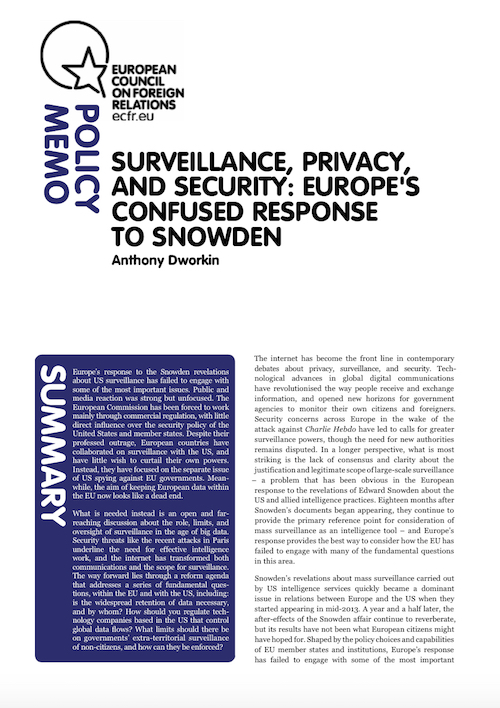Surveillance, privacy, and security: Europe’s confused response to Snowden
Europe needs to work towards new rules for digital surveillance
The reaction to the recent Paris attacks has shown that digital communications are at the centre of debates about security and human rights. There have been calls to give European governments greater surveillance powers against terrorism, but any policy decisions must also address unresolved questions about the legitimacy and democratic oversight of large-scale data collection. The EU’s lack of clarity and consensus on the subject of surveillance has been displayed in its reaction to Edward Snowden’s revelations about data-gathering by the US and other states, this new ECFR policy memo argues.
“Surveillance, privacy and security: Europe’s confused response to Snowden” by ECFR Senior Policy Fellow Anthony Dworkin, explores how European countries and groups reacted to public disclosures about mass surveillance since 2013. Despite the attention that Snowden’s revelations received, the memo argues that Europe has failed to engage with the most important issues that they raised. As a result, European citizens are no closer to a reformed and legitimate framework to balance security protection with human rights and democratic oversight.
In response to Snowden, EU institutions and member states have focused on commercial regulation, spying against public officials, and keeping data within Europe. But these measures would do little to curtail US surveillance, and do not take account of mass surveillance carried out by European security services. Instead what is needed is a new framework for surveillance that addresses the global nature of digital communications and the lack of adequate rules and oversight governing tracking of domestic and foreign citizens.
“The issues surrounding digital communications are vitally important for Europe’s security, its economic future, its values, and the rights of its citizens,” according to Anthony Dworkin. “At a time when Europe is again focused on the threat of terrorism, we cannot afford to neglect the steps that are needed to put surveillance by our own governments and our allies onto a legitimate and democratic basis”.
The European Council on Foreign Relations does not take collective positions. ECFR publications only represent the views of their individual authors.



